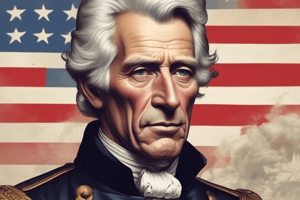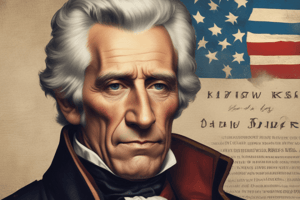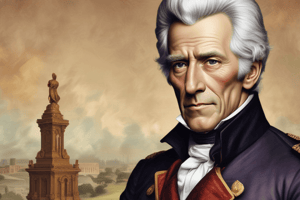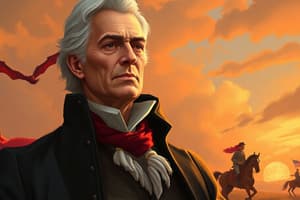Podcast
Questions and Answers
What characterized the political system during Monroe's presidency and what system replaced it under Jackson?
What characterized the political system during Monroe's presidency and what system replaced it under Jackson?
- Two-party system; one-party system
- One-party system; two-party system (correct)
- No-party system; two-party system
- Two-party system; no-party system
What were supporters of Jackson known as, and what were supporters of his leading rival, Henry Clay, called?
What were supporters of Jackson known as, and what were supporters of his leading rival, Henry Clay, called?
- Republicans; Democrats
- Whigs; Democrats
- Federalists; Republicans
- Democrats; Whigs (correct)
What did the Democratic Party support?
What did the Democratic Party support?
- Centralized government, limited opportunity for all, and protectionist trade policies
- Local role, limited government, opportunity for all white men, regardless of wealth, and free trade (correct)
- Local role, expansive government, limited opportunity for all, and free trade
- Centralized government, limited opportunity for all white men, and free trade
What was the opinion of the Democratic Party towards high tariffs and high taxes?
What was the opinion of the Democratic Party towards high tariffs and high taxes?
What did the Whig Party resemble in terms of historical political parties?
What did the Whig Party resemble in terms of historical political parties?
What did Jackson's inauguration lead to in the White House?
What did Jackson's inauguration lead to in the White House?
What did Supreme Court Justice call Jackson's inauguration?
What did Supreme Court Justice call Jackson's inauguration?
What was Jackson's opinion about the Bank of US?
What was Jackson's opinion about the Bank of US?
What was the primary reason for Andrew Jackson's objection to the National Bank?
What was the primary reason for Andrew Jackson's objection to the National Bank?
What was the outcome of Jackson's opposition to the recharter bill of the National Bank?
What was the outcome of Jackson's opposition to the recharter bill of the National Bank?
What did Jackson do with the funds from the National Bank after vetoing the recharter bill?
What did Jackson do with the funds from the National Bank after vetoing the recharter bill?
What was the impact of the Nullification Crisis on South Carolina?
What was the impact of the Nullification Crisis on South Carolina?
How did Jackson approach internal improvements such as the construction of the Maysville Road?
How did Jackson approach internal improvements such as the construction of the Maysville Road?
What was the outcome of the Indian Removal Act of 1830?
What was the outcome of the Indian Removal Act of 1830?
What was the result of the forced relocation of the Cherokee, known as the Trail of Tears?
What was the result of the forced relocation of the Cherokee, known as the Trail of Tears?
What characterized the political system during Monroe's presidency?
What characterized the political system during Monroe's presidency?
What did supporters of Jackson and his leading rival, Henry Clay, call themselves?
What did supporters of Jackson and his leading rival, Henry Clay, call themselves?
What was the opinion of the Democratic Party towards high tariffs and high taxes?
What was the opinion of the Democratic Party towards high tariffs and high taxes?
What was the outcome of Jackson's opposition to the recharter bill of the National Bank?
What was the outcome of Jackson's opposition to the recharter bill of the National Bank?
What did the Whig Party resemble in terms of historical political parties?
What did the Whig Party resemble in terms of historical political parties?
What was the impact of the Nullification Crisis on South Carolina?
What was the impact of the Nullification Crisis on South Carolina?
What was the primary reason for Andrew Jackson's objection to the National Bank?
What was the primary reason for Andrew Jackson's objection to the National Bank?
What did Jackson do with the funds from the National Bank after vetoing the recharter bill?
What did Jackson do with the funds from the National Bank after vetoing the recharter bill?
What did Jackson's inauguration lead to in the White House?
What did Jackson's inauguration lead to in the White House?
What was the outcome of the Indian Removal Act of 1830?
What was the outcome of the Indian Removal Act of 1830?
What was the outcome of Jackson's veto of the recharter bill for the National Bank?
What was the outcome of Jackson's veto of the recharter bill for the National Bank?
What was the primary reason for the Nullification Crisis?
What was the primary reason for the Nullification Crisis?
What was the outcome of the Indian Removal Act of 1830?
What was the outcome of the Indian Removal Act of 1830?
What characterized Jackson's approach to local projects like the Maysville Road?
What characterized Jackson's approach to local projects like the Maysville Road?
What was the outcome of the forced relocation of the Cherokee, known as the Trail of Tears?
What was the outcome of the forced relocation of the Cherokee, known as the Trail of Tears?
What was the Whigs' stance on a national bank, internal improvements, and tariffs?
What was the Whigs' stance on a national bank, internal improvements, and tariffs?
What characterized Jackson's aggressive tactics in office, such as moving money from the National Bank to 'pet banks'?
What characterized Jackson's aggressive tactics in office, such as moving money from the National Bank to 'pet banks'?
What was the result of the Nullification Crisis?
What was the result of the Nullification Crisis?
What marked the emergence of a new political era according to Jackson's election in 1828?
What marked the emergence of a new political era according to Jackson's election in 1828?
What was the Whigs' main support base during Jackson's presidency?
What was the Whigs' main support base during Jackson's presidency?
Flashcards are hidden until you start studying
Study Notes
Andrew Jackson's Presidency and Key Events
- Support for Andrew Jackson largely came from the South and West, urban workers, and immigrants, while Whigs primarily had support from New England and mid-Atlantic states.
- The National Bank, chartered in 1816 for 20 years, played a significant role in the national economy, but Jackson objected to its concentration of economic power.
- Jackson's opposition to the National Bank led to the recharter bill being vetoed, and he ordered the transfer of funds to state "pet banks," symbolizing his aggressive tactics in office.
- The Nullification Crisis arose from a tariff impacting the Southern economy, leading South Carolina to pass an ordinance nullifying federal laws, resulting in a showdown with Jackson.
- On internal improvements, Jackson supported local projects by the states and vetoed a bill for the construction of the Maysville Road within Kentucky.
- The Indian Removal Act of 1830 mandated Native American tribes to voluntarily move west of the Mississippi or remain under state laws, leading to the forced relocation of 18,000 Cherokee to present-day Oklahoma.
- Native tribes like the Cherokees, Chickasaws, Choctaws, Creeks, and Seminoles lived in the old southwest, cultivating cotton and practicing slavery, but their land was seized for cotton cultivation.
- In 1832, John Marshall's Supreme Court ruled that Indian nations should be dealt with by the federal government, not state governments, but Jackson ignored this decision.
- The forced relocation of the Cherokee, known as the Trail of Tears, resulted in at least one-quarter of them dying during the move.
- Jackson's election in 1828 reflected the emergence of a new political world and his intense patriotism and democratic manner epitomized American ideals for many.
The Presidency of Andrew Jackson
- The Whigs mainly had support from New England and mid-Atlantic states, urban workers, and immigrants
- The Second National Bank was chartered in 1816 and played a major role in the national economy
- Jackson vetoed the recharter bill for the National Bank, arguing that it concentrated too much economic power
- The Nullification Crisis arose due to Southern opposition to tariffs, leading to a showdown between South Carolina and Jackson
- Jackson believed local projects should be left to the states, as seen in his veto of a bill for the Maysville Road
- The Indian Removal Act of 1830 mandated Native American tribes to move west of the Mississippi or remain under state law
- The Cherokee, one of the Five Civilized Tribes, were forcibly removed from their land to Oklahoma, resulting in the Trail of Tears
- Jackson's election in 1828 marked the emergence of a new political era
- Jackson was seen as a patriotic and democratic figure, representing American ideals
- The Whigs supported a national bank, federal funding of internal improvements, and a protective tariff
- Jackson's aggressive tactics in office, such as moving money from the National Bank to "pet banks," symbolized his presidency
- The Nullification Crisis was resolved through the passing of a lower tariff bill and Jackson's forceful message
Studying That Suits You
Use AI to generate personalized quizzes and flashcards to suit your learning preferences.





